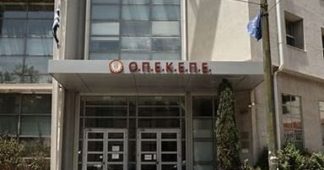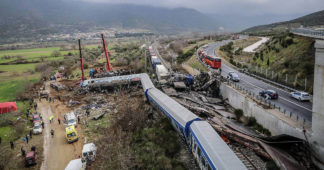By Helleniscope
Aug 14, 2025
European Chief Prosecutor Laura Kövesi launched a scathing attack on the Greek Government, stating bluntly that the 57 deaths in the Tempi tragedy are a consequence of corruption in Greece.
The Romanian prosecutor—who in recent weeks has come under fire from the Greek Government for exposing the OPEKEPE scandal involving ministers and party officials—told the German news outlet ARD that financial scandals claim lives. She cited the Tempi tragedy as an example and noted that she receives “recommendations” from certain people not to conduct such thorough investigations into corruption cases.
“How many more tragedies must we endure before we finally understand that financial crimes are not minor matters?” Kövesi asked, stressing that corruption can have deadly consequences. She considers the Tempi disaster the most characteristic example of corruption in Europe. “Our investigations have shown that Greece received millions from the EU for its railway network. The signaling system was supposed to be upgraded. If the project had been implemented on time and correctly, the tragedy could have been avoided,” she said.
It is recalled that she authored the damning report against Greece on the “sinful” OSE Contract 717, which concerns railway signaling and remote control and is linked to the Tempi disaster.
While ARD’s report focused on Tempi, it also described the difficult work Kövesi faces in investigating corruption cases, from fraud in EU subsidies to cross-border crimes. “The biggest fraud cases in the EU are in her office,” the report notes. “There is no clean country. Corruption, subsidy fraud, tax and customs fraud exist everywhere,” Kövesi emphasized.
Indicative of her workload is the fact that the European Public Prosecutor’s Office under her leadership has launched investigations into more than 2,666 cases, with estimated damages of €24.8 billion.
Kövesi also revealed that she has become unwelcome among certain politicians. As she disclosed, some have told her: “Ms. Kövesi, you should not talk so much about these cases and you should not publish data.” For her, coming from Romania—a country with a high corruption index—it is still surprising that in Europe “there is a tendency not to address problems when they arise.” Kövesi became Romania’s youngest and first female Prosecutor General in 2006 at the age of 33, in one of Europe’s most corrupt countries.
“I saw how corruption affected our daily lives. I wanted to do something significant for society, and I thought I could make a difference through my work,” said the European Chief Prosecutor. In 2019, she became the first woman to hold the position of European Chief Prosecutor.
As for Germany, she said it is no exception either. Tax fraud is particularly common, resulting in the tax authorities losing nearly €10 billion annually.
From ARD’s report, it is clear that Kövesi is fully aware of the responsibility that comes with her position—as well as the reality. As she said, corruption will never disappear. “But the fight is worth it, because the sense of justice is essential for citizens, for democracy. This can only be achieved with an independent and strong judiciary.”
We remind our readers that publication of articles on our site does not mean that we agree with what is written. Our policy is to publish anything which we consider of interest, so as to assist our readers in forming their opinions. Sometimes we even publish articles with which we totally disagree, since we believe it is important for our readers to be informed on as wide a spectrum of views as possible.











